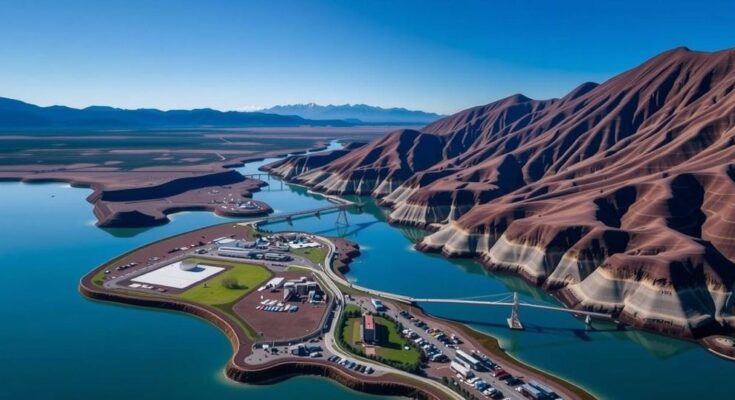Bolivia has signed a $1 billion agreement with China’s CBC to develop lithium carbonate plants in the Uyuni salt flats, aiming to boost its global lithium market presence. The project includes advanced DLE technology and retains majority control through state-owned YLB. However, political challenges loom ahead due to legislative approval requirements and the impact of foreign dependence on long-term stability.
Bolivia has recently formalized a $1 billion agreement with China’s CBC, a subsidiary of the prominent battery manufacturer CATL, to construct two lithium carbonate extraction facilities in the Uyuni salt flats. Announced on November 26, this strategic partnership aims to position Bolivia as a significant player in the global lithium market, capitalizing on its extensive natural reserves, which have historically been underutilized. The facilities are projected to produce a combined annual output of 35,000 metric tonnes of lithium, employing state-of-the-art direct lithium extraction (DLE) technology that promises quicker and more environmentally sustainable production processes.
In this collaboration, Bolivia’s state-owned company, YLB, will retain a controlling share of 51%, thus securing national oversight of its valuable resources. President Luis Arce heralded the partnership as a pivotal achievement in the nation’s quest for international recognition in lithium production and its potential impact on global pricing dynamics. However, obstacles such as the need for parliamentary sanction, coupled with Bolivia’s politically fragmented legislature, could impede timely implementation, especially with upcoming elections scheduled for 2025.
This agreement follows an earlier $976 million deal with Russia’s Rosatom-owned Uranium One Group, which also focuses on utilizing DLE technology to yield 14,000 tonnes of lithium per annum. Notably, last year, both Uranium One and CBC, alongside Citic Guoan Group, were selected to pioneer pilot DLE plants in Bolivia, with aspirations for scaling up operations subsequently. The Bolivian government aspires to enhance its export capacity to 50,000 tonnes of lithium carbonate equivalent annually.
Nevertheless, heavy reliance on Chinese and Russian investments gives rise to potential risks concerning Bolivia’s long-term economic viability and autonomy. While these partnerships offer immediate financial infusion and technological advancements, they may inadvertently diminish Bolivia’s control over its resources and tether it to the geopolitical agendas of these foreign stakeholders. Such dependencies could manifest unfavorable consequences, including diminished local economic benefits or restricted technology transfers, thereby undermining national sovereignty in the lithium sector.
Despite possessing the world’s largest lithium reserves, estimated at 23 million tonnes, Bolivia has lagged behind regional competitors like Chile and Argentina. Infrastructure deficiencies, regulatory challenges, and persistent political volatility have often hindered development efforts, generating apprehension among potential investors. Historical precedents indicate that since the 1990s, Bolivia’s attempts to cultivate its lithium industry have been obstructed by bureaucratic complexities and logistical bottlenecks, necessitating companies to navigate a plethora of environmental regulations and legislative approvals amid an increasingly fragmented political landscape.
Bolivia is home to the largest lithium reserves globally, yet it has struggled to effectively harness these resources. The nation is now engaging in significant international partnerships, particularly with China and Russia, to innovate and enhance its lithium production capacity. Given the growing global demand for lithium, especially in battery manufacturing, Bolivia’s strategic maneuvers may influence its economic prospects and geopolitical landscape. However, the complexities of political stability and legislative processes pose challenges to reaping the full benefits of these ventures.
The recent $1 billion agreement between Bolivia and China’s CBC marks a historic advancement in leveraging the country’s lithium resources. While the potential benefits include increased production and investment, the socio-political landscape poses significant risks that could affect long-term outcomes. As Bolivia seeks to establish itself in the global lithium arena, careful consideration of its governance and international partnerships is crucial to safeguarding its interests and sustaining its sovereignty over natural resources.
Original Source: www.intellinews.com




